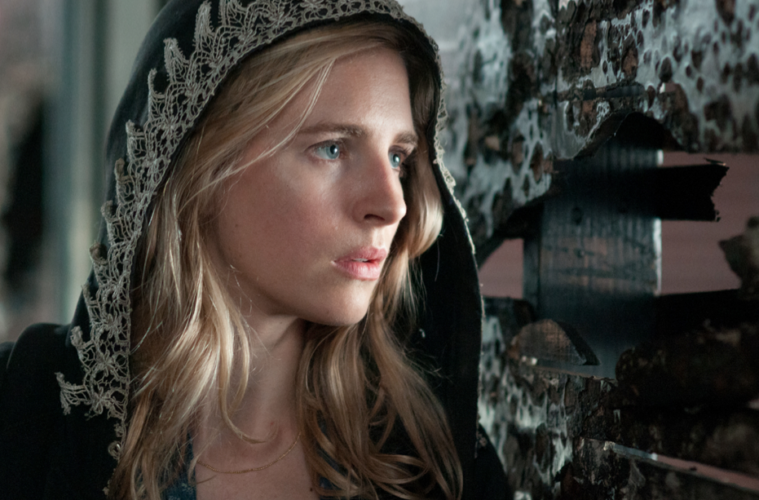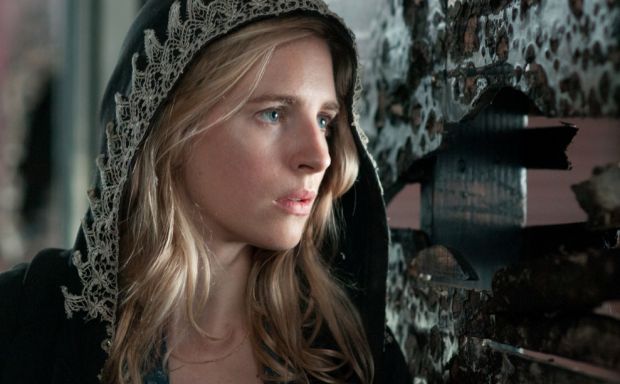
The East, which recently opened in limited release, is a complicated film that manages to stay with you long after the credits roll. In our daily lives we are so completely unaware of what happens to the food that “expires” in grocery stores or how sick medicines can actually make us. The latest film from co-writer/director Zal Batmanglij and co-writer/star Brit Marling uncovers that side of the corporate world and exposes the waste and the potential harm through the veil of an eco-terrorism espionage thriller that hits all the right marks.
I was able to join in on a roundtable with Batmanglij and Marling a month ago to discuss their experiences living with direct action groups and anarchists, how they felt about working with a company like Fox Searchlight to make a film that skewers corporations, the name of the film, what it was like to eat meals made from dumpster diving, they’re experiences touring with the film across the country, and even the inspiration to make this into a corporate espionage film. Check out the conversation below.
The Film Stage: What did the prayer in the film that Brit Marling’s character say? “Keep me strong, but don’t let me be weak.”
Brit Marling: Yeah, “To not be arrogant, but to not be weak.” We were really interested in the idea that Sarah, who is a religious person, finds herself in a very morally gray zone in which there are no obvious answers. She’s ex-FBI, so she comes from being trained in law enforcement. Our laws are based on a body of ethics that hopefully a society agrees upon. In corporate espionage, which is the job that she does now, it isn’t law enforcement. What you’re really connected to is a profit margin and making more money next quarter than you did the quarter before. So I think she finds herself in a morally gray zone during her deep cover experience with The East. I think she goes on this journey and while she is in this anarchic space and they will often speak openly against organized religion, but I think her experience of connecting with other people and nature makes her spirituality deeper. That’s why the film ends with her prayer and an amen. Even though a lot of her perspective has changed, she’s still the same person.
Zal Batmanglij: This is not a woman who loses her religion. It’s a woman who finds her religion.
Was this group based on anyone or any group in particular?
Batmanglij: Not for research, but in the summer of 2009 we did go and live with various direct action groups. Anarchist farmer collectives. So we had direct experience with these people. We were very moved by their way of living and fascinated by it. When it came time to write the movie, The East is a completely imagined group inspired by that summer. But it was more inspiration for the texture of that world and our characters, and not as much the actual characters or the actual direct actions that they do. The direct actions that they did in the film were inspired by our frustrations with the headlines we were reading in the news. While The East is imagined, the actual corporate crimes in the story are all exactly as they are. They’re not hyperbolized or dramatized for effect. There are drugs on the market that have permanent side effects and there are companies that are poisoning the water systems and causing kids to die of cancer. That’s all true and documented. We figured out a fictional way to bring those stories into light and have a dramatic interaction with them.
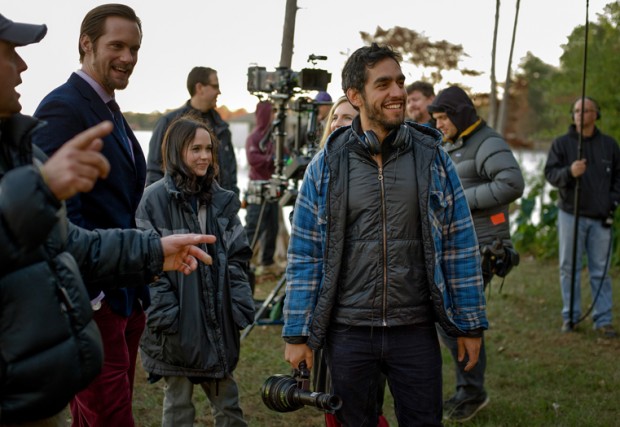
You did all that from your summer, but how about researching corporate spies?
Marling: Yeah. That we couldn’t do. [Laughs]. “We’d like to intern.”
[Everyone laughs]
Marling: But we did read a lot about it. There have been articles and discussions about how 40% of our intelligence work is now outsourced to private companies. That’s an unusual space to be in because we think of espionage as having some oversight from the democratic process or that it’s somehow connected to government, but now a lot of it is connected to private enterprise. That’s a brave new world to be in. It was an interesting space to set an espionage story.
Batmanglij: The more we researched espionage, which is something that’s always fascinated us because we met in college in Washington, D.C., the more we realized that a lot of it is being outsourced.
That summer, what was the impetus to go off and live off the grid and what was the first step? Do you Google, “How to jump a train and run around the country”?
Batmanglij: Yeah, you do actually. We had spent a lot of time researching this stuff on the internet. We were fascinated by dumpster diving. We’d read a lot about it. I guess the first and only step is giving yourself permission to just go out and look for it. It’s funny because we’re all living in these scripts every day and we don’t even realize it. Like we will get out of this hotel and we’re going to go to a restaurant to have lunch down the street. It’s already been planned. But if we just got off the script…
Marling: And went to the dumpster behind Whole Foods…
[Everyone laughs]
Batmanglij: Or even the dumpster here! We could easily make lunch for ourselves. And you know, at first we used to laugh about it too. But then what happens is that when you start really experiencing it it kind of blows your mind. At first we were just watchers. We were anthropologists because we were newbies. So we didn’t know and we had to be with people that were more experienced so they could teach us. These people are very open to teaching. It’s something they believe in. So we would go to dumpsters and we’d watch these people forage through a dumpster. The dumpster behind any grocery store is locked. But if you pick the lock, you open it up, and it’s filled with all this very edible food that has to be thrown out by the sell-by date because that’s the law, right? So, that food is all headed for a landfill. It’s just going to be buried in all its plastic wrapping and forever forgotten. These guys take that food and they forage and come back to another group of people. Whether it’s rural or urban, and they cook that food and feed about a hundred plus people. Something we noticed with every community that we interacted with is that they would invite the people who were living in that community who were not part of the collective to have lunch. There would be kids who were going hungry for a lot of meals. They were coming and being fed with this food. When you watch it with your own eyes, you can no longer just be an anthropologist. You become a participant and a believer in this. There’s so much waste out there.
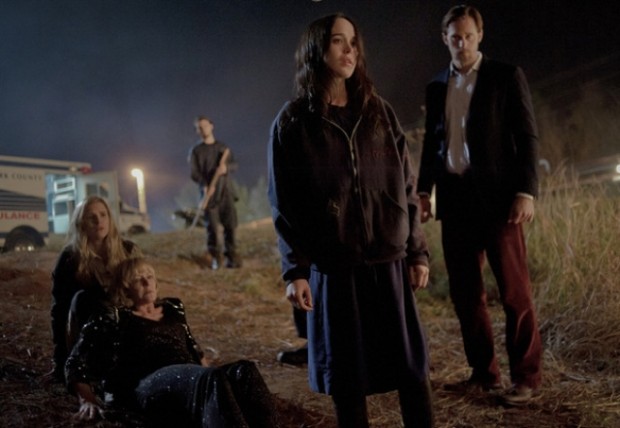
These groups were very welcoming to you? Even after you explained what you were there for and looking for?
Marling: We weren’t looking for anything. That’s actually the amazing thing about these groups: they’re openness to sharing all the knowledge they have. At that point we were just living our lives. We weren’t looking to tell a story about it. We were looking to have an experience and to try to explore for ourselves this question of “How do you live your life in an accountable way?”
Batmanglij: Or a meaningful way.
Marling: Yeah, or a meaningful way. We really learned a lot from them. They were incredibly open. We were transformed by the experience. One of the most important things that we learned from them was this idea of collective living and working in a tribe and all the sense of meaning and feeling that comes from living in a group or a family. When we came back and wanted to keep telling stories, we looked around and realized the most valuable thing we had was each other. Our friend Mike from school whom we met at Georgetown. We had been making films that way at school and we felt we had to learn how to do it within the system. I think that summer really taught us that we didn’t need to do that. That the thing of value was the tribe that we had. Learning to make films just for the pleasure of making them and gathering whatever resources you had around you. Being a scavenger to make a movie. It was a liberation.
Batmanglij: Once you eat three meals a day from a dumpster, you start seeing what is needed and what is available and what is waste versus what is bounty very differently. So we start seeing, “Oh, we’re not disenfranchised from moviemaking.” We’re not poor. We have a richness. It’s not a richness in dollars. It’s a richness in… there were lots of other young people who were hungry to make movies around us. Almost everyone we knew in Los Angeles. All we had to do was get those people together and all of a sudden we were in a completely different space then we were before that summer.
So you took that experience and added the element of eco-extremism? That wasn’t in your mind to begin with?
Batmanglij: No, no. A lot of these groups are direct action groups. They’re very frustrated. They’re anarchists. They believe in waking up the world. They believe we are on a train headed for a brick wall. So they want to get as many people to wake up and say, “We’ve got to do something. We’ve got to stop this train.”
Marling: Get off the train and lay track in a new direction. Which is hard and muddy and exhausting work. But potentially life-saving.
Batmanglij: And they really believe we’re headed for a brick wall. So, if you know you’re headed for a brick wall, how do you sit by and let everybody take the train there?
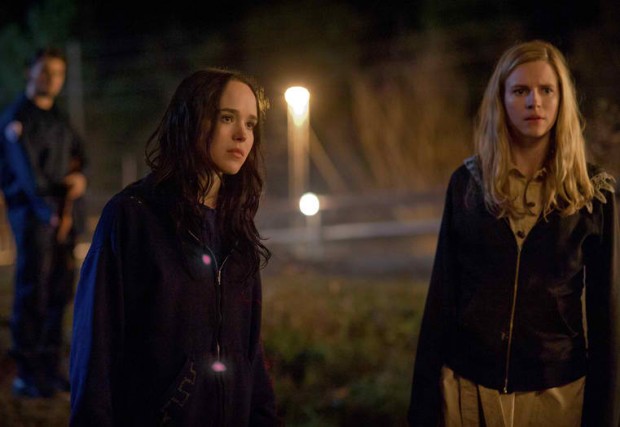
I think there’s a strong argument you’re making for solidarity versus individualism. But I haven’t seen this in American films. Is this a generational thing? Or just particular to your film making?
Bartmanglij: I think it’s like what Brit said. When we came back from that summer we found the one thing that was free, abundant, and available to us was each other. We feel very fractured without that.
Marling: I was just going to add that it wasn’t just free and abundant, but it was a source of meaning. For all of our connections these days on Twitter and Instagram and Facebook, we also feel more isolated and alone than we ever have before. I think it’s just from the lack of real human contact. Someone was telling me that one of the scenes that unsettled them the most was the group getting naked and bathing in the water together. That that was really hard for them. I understand that. It was hard for me, too. It was hard for us to write. It was hard to perform. And the question is, “Why?” Why is there such a fear of intimacy and connection now and yet such a desire to be intimate and to connect? I think after that summer, that was something we really came away with. How much meaning and sense of purpose and satisfaction comes from being in a group. I don’t think we were designed to be alone. I don’t think our origins as human beings were lonely origins. We learned to work and function in tribes. I think it’s a sad thing that we’ve broken away from that.
How much do you want people to take away from the film in terms of frustration with corporate greed? Is the primary motivation here just to tell a story and be entertaining or do you want there to be commentary behind it in regards to that?
Batmanglij: I don’t think that we need to tell anyone to be frustrated with corporations.
[Room laughs]
Batmanglij: Doesn’t matter what side of the political spectrum you’re on. We’re not original in saying that. It’s hardly our intent to preach anything. The only thing, if we’re saying anything at all, is the idea of the collectives are interesting versus individualism. But I don’t think we’re even married to that because at the end she’s an individualist going on. We just want to ask questions. Have a dialogue. It’s great because we traveled around America that summer and now we get to travel around America again and share this film with people. Whether people like it or don’t like it, all of that stuff is moot. What matters is that people are having a conversation about it and we found that people are very hungry to talk a lot about these ideas. One of the things that has moved me the most was in Philadelphia we had a couple different young parents bring their teenage kids to the movie and seeing them ask questions together was cool. I never expected that.
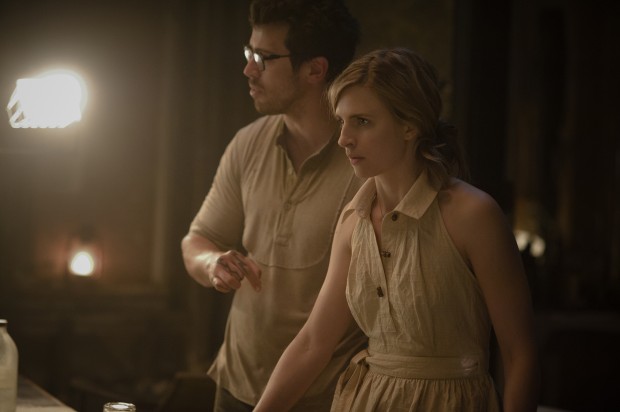
In this way, do you think your film is less about an experience and more about opening things up and having a discussion?
Batmanglij: I think it’s about one woman’s journey. She’s conservative. She’s religious. She goes deep cover into a group that’s very different from her. Politically and ideologically, she’s very clear on that. But she touches them and they touch her in a human way. There’s a human part of it.
Marling: I think, also, a huge part of it is that we love espionage movies. We love [Alan J] Pakula films from the 70s. All The President’s Men and Klute and even Pelican Brief. The Bourne trilogy. We go to the movies because we want to be entertained and we want to feel something. So first and foremost we were just trying to craft a great espionage thriller that was set in a landscape that is new. That we haven’t seen before. We’ve seen a lot of espionage in Cold War Russia. It was exciting to write something that would keep you on the edge of your seat that was set in the now and about what’s happening now and the things we are thinking and feeling.
How did you come up with the name The East?
Batmanglij: I don’t remember how we came up with it but when we came up with it it stuck. For us I think it’s exciting because the east coast of America is the center of power, but also the east is the other. The far east or the Middle East. So it’s funny that this word can mean so many different things.
Marling: I think the compass thing comes to mind, too. This question of being in a morally gray time with Sarah trying to set her compass at true north and this idea that The East is maybe pulling the moral compass in a different direction.
It appeared to be the Northeast to me and I was amazed to hear it was shot in Shreveport, Louisiana.
Batmanglij: Not too far from here. Two hours away.
Marling: That’s really a testament to Zal. He picked amazing collaborators and Roman Vasyanov, the DP, and Alex DiGerlando, the production designer. The head of the studio used to refer to them as “The Brothers East” because they’re all sort of the same age and all sort of the same height and he’d see the three of them together journeying off into the woods of Shreveport to carve out a space that looked like New England. The East house is supposed to be this crumbling mansion in the woods of New England but it’s actually a house in downtown Shreveport.
Batmanglij: A night club.
Marling: It was a former alternative lifestyle night club that was in downtown and had all this black and gold paint and statues. Zal and Alex and Roman transformed that space and made it a world that was so rich when the actors would come to set everyday, we all wanted to live in our rooms in this house because they were so richly realized. We were lucky.
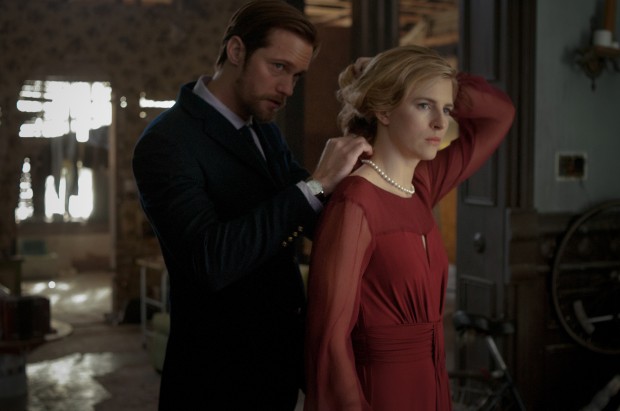
When you were there that summer, what did you miss the most about creature comforts? And whose idea was the spin the bottle game?
Batmanglij: We missed everything at first. I remember when we were going to leave, right?
Marling: There was a point where about a week or two into it and I had a headache and there was no Tylenol. You’re sleeping like 20 people to a room on the floor. I was hungry and I just wanted french fries and a Coca Cola. I was just dying. I thought, “I’m going to get up, put my backpack on, and I’m going to take my mace and walk through this neighborhood and find the nearest hotel, check in and get room service. Watch a movie.”
Batmanglij: A shower! You want a shower.
Marling: A hot shower. Get all the dirt off. Then, I didn’t do that. We stayed and we kept going. Something crosses over and you realize the creature comforts are a lot about settling your own anxiety. If you instead address the anxiety you can get to a kind of stillness that there’s an incredible peace. You realize you don’t really need anything. That’s one of the profound things of living with these different groups of people this way. How little you actually need and what you need changes. You actually need people and human interaction. You need that more than I need french fries and a television series to lose myself in. And as for spin the bottle, Zal?
Batmanglij: Spin the bottle was based on us encountering a group that played spin the bottle. It’s an amazing feeling when you haven’t watched any movies or seen any television or listened to any music. That’s your only sort of entertainment, it’s kind of stunning.
Marling: And at first you think, “Oh, this is such a middle school activity.” The last time I played spin the bottle was when I hadn’t kissed anyone before and it seemed so scary. But it’s amazing because the experience is actually really genuine and pure. There was this whole thing of consent. You have to ask if you can do something. You have to get verbal consent that you can. Zal did a brilliant thing on set which is we had shot the scene with the arch of the script where Izzy asks Sarah for a kiss, they kiss and then Sarah uses that as a way to ask Benji for a kiss. We shot that arch and then Zal came in and he’s like, “Throw out the script. You guys have been living as these characters for a while. There’s a bottle. You’re in this room. Play the game for real, and we’re going to film it.” The things that came up, it was exactly like what happened with the experience on the road. People let go. They were really excited to touch and connect with each other. When Alex’s Benji spins that bottle and it landed on Danielle who plays Tess in the film, and he asks if he can kiss her stomach, we were all in the room like, “What’s she going to do!? Is she going to say ‘Yes’?” And she just kind of leans back and unbuttons her dress and he kisses her there. It’s so tender and so sincere. And they were both moved by it. You could feel it. It was like the energy of what we felt on the road which is a hard thing to capture years later on a set when you have five minutes to shoot. Zal made that space for the actors and it was incredible to be there.
The timing of your experience and the script writing is interesting because it overlaps with Occupy Wall Street. I’m wondering if coming back from the experience and seeing such a public display of the communalism things that you had seen on the road. Did that affect how you approached the script or did you see Occupy as something you could almost anticipate because of the experience you had before?
Batmanglij: It was a mixed bag of intense emotion because it happened three or four weeks before we started shooting. So we were deep in prep. Everyone was on their way into Shreveport at different times and it just kind of lit a fire under our butts. We needed to make this movie. This was something that was happening. Most people had never seen these images or this kind of stuff in the mainstream press before Occupy. So it was exciting that it was coming to the forefront. We realized how fringe our experience had actually been. Once it’s your experience, you sort of let it in and it feels more normal.
Batmanglij: Does someone that hasn’t asked a question want to ask something?
Yeah. At what point did the studio get involved and would this movie be made without their involvement?
Batmanglij: Yeah, we were ready to make this movie after Sound of My Voice, which was a great experience. We made that [do or die] and we were ready to make this the same way. The studio wanted to make it with us and they turned out to be great partners.
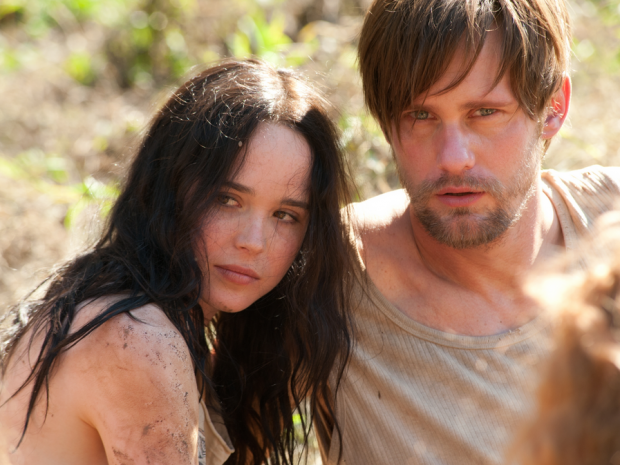
Did you have any resentment towards that? I mean, in terms of the movie’s message and them being a big corporation and having someone like Fox attached to the picture. There’s a little bit of contradiction.
Marling: Well, no because at the end of the day, this is the funny thing about corporations. They’re just human beings. They’re just a collection of people. The collection of people at Fox Searchlight are incredible people. Claudia Lewis and Nancy Utley and Steve Gilula, they are buying and distributing some of the best movies around. Without them, I don’t know if those films would ever see the light of day. So when they read the script and were moved by it, and were like, “Hey, we want to make THIS story. And we don’t want to change it. We want to make it this way and we want to help you guys realize this.” We were like, “OK, let’s do this.” They were true to their word and we did make that script into that film and that’s an exciting and rare thing. That’s what’s awesome and strange about the time we’re in. There’s no black and whites about it. It’s not like all corporations are bad. There are all kinds of good corporations, too. There’s all sorts of good people working at corporations. So it’s a complicated space to navigate. And the power of the consumer is really interesting. We feel that corporations have all these powers but it’s ultimately the consumers who hold the power in what we do and don’t vote for with our dollars. So it’s a pretty strange time that we’re in trying to navigate all this.
I was just curious if there was going to be any sequel planned for Sound of My Voice?
Batmanglij: Maybe Sound of My Voice. I mean, it wasn’t so popular at the box office. But maybe on home entertainment it will get some sort of following in the years to come and we’ll have to make a sequel.
Marling: People vote with their dollars. So if they vote with their dollars for Sound of My Voice, we’ll be forced to make a sequel.
But isn’t there a plan for it already?
Batmanglij: Oh, yeah. We have two more movies. They exist.
Spoiler Warning:
There’s a moment in the film when Sarah finally comes back to the camp and Alexander Skarsgård is sitting around and he’s noticeably lost a lot of weight. I’m curious because you don’t touch on it. She doesn’t say anything.
Batmanglij: Thanks for noticing.
Is that something that got cut or is that something you just hid in the film?
Batmanglij: No, I think that he doesn’t run away like Luca (Shiloh Fernandez) does but Izzy (Ellen Page) was his best friend. His partner. I think they might have even had a romance at one point. I think that her death has changed him.
So he’s fractured.
Marling: And grieving. Because he’s a person that cannot give up his cause. That grief ends up being an internal thing which has a physical manifestation. Which is very cool you noticed.
Batmanglij: And we’re not big believers in exposition. We think that audiences are so smart these days that it’s more fun to just put things there and let people put them together if they want to.
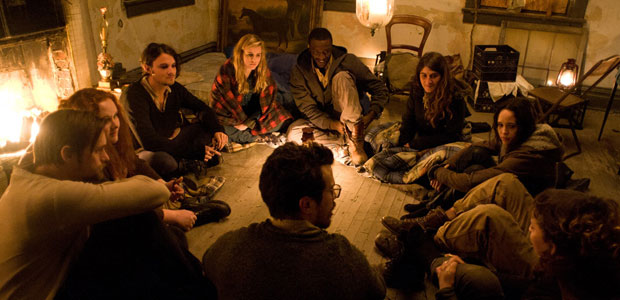
The East is in limited release and expanding this weekend.

